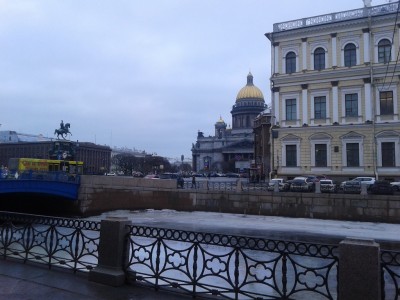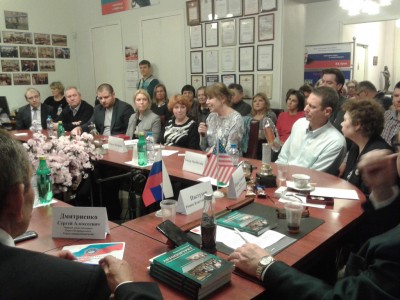From: Sharon in St. Petersburg
February 5, 2016
Dear Friends,
I’ve vowed to look for the positive side of international news these days with the ever-present belief that “It’s better to light a candle than curse the darkness.”
Walking down the runway to board the Finnair plane at JFK airport, I was pleased to see that Finnair still provides a table of newspapers before entering the plane — a treat that few other airlines offer these days. I picked up the 3 February 2016 edition of the New York Times.
Seated and finally able to catch up on the news, I flipped through the NYT to the Op-Ed page on A22. The enviable upper-left-corner’s lead headline shocked me: it read The Pentagon’s Top Threat? Russia …. And continued on to say that, “The Pentagon has put Russia at the top of its list of national security threats to the U.S. and as a result it planned to increase the deployment of heavy weapons, armored vehicles and troops on rotating assignments to NATO countries in Central and Eastern Europe.
In a speech on Tuesday, Secretary of Defense Aston Carter listed a hierarchy of threats to the United States, which included Russia, China and North Korea. He proposed to quadruple US military spending in Europe in from $789 million in 2016 to $3.4 billion in 2017 in order to provide adequate protection from Russia. The article went on and on and on.
What Ash Carter failed to say is that Russia’s recent military build-up occurred only after and because of the decisions of a few powerful people on the other side of the Atlantic to drive NATO up to Russia’s borders. There was little consideration to the many possible consequences. The recent episode of leading Ukraine to believe that they could seamlessly and quickly join the European Union and NATO while neglecting to give proper consideration to the continuing threat moving closer and closer to Russia’s borders.
The NYT writes as though there are battalions of Russian troops stationed in Ukraine – which there are not (and never has been). It is widely understood that there have been “volunteer” ethnic Russians there who have joined the fighting. These are volunteers (as stressed by OSCE) whose families live or have come from Eastern Ukraine. They feel strongly that the whole of Ukraine should not be dominated by Western Ukraine’s philosophy (a complicated world view which was aligned with Hitler in WWII).
Ash Carter does not fail to bring up the annexation of Crimea––forgetting that his compatriots set the international precedent for such changes in Kosovo. Also overlooked is that Russia’s recent military buildup has been defensive in the face of clearly threatening offensive moves on the part of thin slice of self-serving and disingenuous western policy makers.
~~~~~~~~~
St.Petersburg:
 Upon landing at the new streamlined Pulkova Airport, it was a delight to find far less bureaucracy than in the past––no evidence of guards, just a normal airport where people go in and out according to normal security, customs and immigration processing––not unlike San Francisco Airport.
Upon landing at the new streamlined Pulkova Airport, it was a delight to find far less bureaucracy than in the past––no evidence of guards, just a normal airport where people go in and out according to normal security, customs and immigration processing––not unlike San Francisco Airport.
I routinely read Russian, Canadian, German, Scandinavian, Indian and American articles from a wide variety of international news services. It is quite evident that US news carries far more fear-generating reporting than the rest of the world media, and these antiquated and transparent attempts at manipulation are no longer effective in the information age.
Any inquiring reader can easily find that increasing numbers of European high officials are now lobbying for the sanctions to be lifted against Russia and a return to normalized relations in order to prevent their own economies from further stagnating. The sanctions are hurting western European countries more than the Russians who are beginning to manufacture products formerly bought from Europe and abroad––which could lead to Europe permanently losing their markets in Russia. Many European countries are openly challenging recent US led initiatives against Russia as being solely in the best interest of the United States and not in the best interest of the alliance or world-wide well-being.
Yet fear-based reporting such as the above mentioned New York Times piece continues to show up.
 Retrieving our luggage and exiting the airport, we soon found ourselves at a 5 pm meeting at the St Petersburg Entrepreneurs Union. The meeting was already in full swing upon our arrival––about 40 or 50 of CCI’s alumni from our US business training programs were gathered. It was wonderful to be in this room with these successful members of St.Petersburg’s vibrant and still strong economy. I spoke for a few minutes about different types of projects that CCI hopes to initiate in 2016-2017. Our alumni response was terrific. They unanimously want to keep their connection with their American friends and citizen diplomats. They are interested in all types of exchanges with Americans–– business-to-business, professionals-to-
Retrieving our luggage and exiting the airport, we soon found ourselves at a 5 pm meeting at the St Petersburg Entrepreneurs Union. The meeting was already in full swing upon our arrival––about 40 or 50 of CCI’s alumni from our US business training programs were gathered. It was wonderful to be in this room with these successful members of St.Petersburg’s vibrant and still strong economy. I spoke for a few minutes about different types of projects that CCI hopes to initiate in 2016-2017. Our alumni response was terrific. They unanimously want to keep their connection with their American friends and citizen diplomats. They are interested in all types of exchanges with Americans–– business-to-business, professionals-to-
One PEP Fellow excitedly reported, “I want to invite Americans to my home here in St. Petersburg––it’s past time for me to pay back the generosity they showed me while on the PEP program.” Around the crowded room other CCI alums were adding their assurances that they would host American citizens in their homes. Today at a wonderful little restaurant owned by a PEP Fellow, Igor Zyablitsev, he unexpectedly offered that he would like to host one American — after sharing that he and his wife have three children at home.
Of course all Russians want to normalize trade conditions and be rid of the sanctions. But I have to say, they are taking it mildly compared to what we in America would be doing if in their shoes. If our dollar had lost over 30% of its purchasing power due to being sanctioned by another country, how would Washington react? At the same time Russians philosophically understand that sanctions are forcing them to develop products within their own country which were needed all along. The local grocery store and the huge open farmers market where I purchase food on a daily basis are loaded with fruits, vegetables, fresh Russian cheeses, with a line of several women selling vats of freshly-caught fish (one or two with gills still heaving). It was obvious to me that much of the produce had been shipped into this northern city from non-western countries, (since western-affiliated countries are forbidden to trade with Russia). In any case, Russians are not starving and won’t be. Poorly justified and Ill-conceived sanctions are causing more long-term harm among the nations of western Europe than anything else.
Driving into St Petersburg (as is the case with Ekaterinburg, Perm, Chelyabinsk out in mid-Russia), the same distribution of Western automobiles is seen everywhere. New apartment complexes are springing up. In the past fifteen years since the first Putin presidency began, this country has achieved a miraculous level of solid economic and social development.
We were invited to dinner at Mikhail and Irina Nazarov’s home one evening. They live in a former Soviet communal flat built in 1911. Mikhail was born and lived in one room of this flat until the 1990s when he took the initiative to begin purchasing the other rooms. We sat in a kitchen that had been the communal kitchen with small tables and chairs for each family and two stoves on which the five families cooked. Mikhail eventually purchased all of the other rooms and now has the flat for his family of four.
Daughter Dasha has just returned from 2.5 months in America where she attended high school, lived as an American teenager, went to church and developed friendships. She spoke of how difficult it was to leave her new American friends. She was delighted with her host families––everything she saw and heard while in the U.S. was interesting to her. “The notion of war making never entered the discussions we held around the kitchen table,. Do Russians not get as much information regarding international conflicts in their mainstream media as we do––or do they not take it as seriously as some of us do?
Friends if we could just deposit our kids in Russian homes for a month, and if their youth could stay visit our homes for a month, there wouldn’t be anything such as the new Cold War or quadrupling weapon systems for fear of war between our two peoples. How about we consider what each of us can do to achieve this???
If you would like to consider taking a Russian student into your home for a month this summer, show them your local culture, introduce them to friends their ages, get speaking opportunities for them, please let us know!
Already it is time to move on to another day of keeping eyes on the ground in Russia to understand the truth of what is really happening in this important and vibrant country. We will visit Moscow next, and then Volgograd with the expectation to come to agreements with CCI entrepreneurs and Rotarians who wish to undertake joint projects in the coming months and years.
More to follow,
All the best, Sharon
